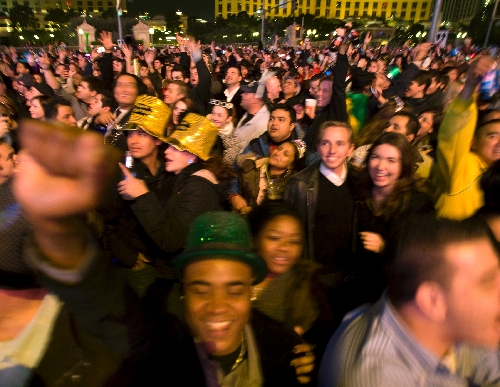Drinking could knock New Year’s Eve revelers cold

Unfortunately, the myth lives on, the myth that alcohol protects men and women from overexposure to cold weather.
And so again this year, as the mercury and wind chill threaten to bring frigid temperatures to New Year’s Eve in Las Vegas, medical practitioners are reminding revelers who plan to parade scantily clad down the Strip that tequila is no substitute for a warm coat, gloves and hat.
"Being out in the cold, we tend to think that alcohol can help take away the chill as our faces flush and skin grows warm," said Dr. Michael Nasiak, an internist with the University of Nevada School of Medicine. "But the myth that alcohol protects us from overexposure to cold is completely false. While alcohol may make us feel warm, it actually aids in dropping our core temperatures."
That means hypothermia can result, a potentially fatal condition that occurs when body temperature falls and the body loses warmth faster than it produces heat.
"The word that is most important in regard to drinking, particularly in the cold, is ‘moderation,’ " said Dr. Mitchell Forman, dean of the Henderson-based Touro University-Nevada College of Osteopathic Medicine. "Cold is the enemy of the person drinking excessively."
Forman said alcohol can reduce the sensation of cold and prevent shivering, so it’s not uncommon for people to remove clothing despite dangerously cold temperatures.
Even when temperatures didn’t drop as low as the 20s predicted for this New Year’s Eve, Chad Henry, operations chief for the American Medical Response ambulance service, said emergency personnel have had to transport New Year’s Eve revelers overcome with the condition to hospitals.
"They have to be warmed at a hospital," he said.
During a five-year period ending in 2009, Henry said, nearly 20 people had to be treated on New Year’s Eve for hypothermia, which can occur in 50-degree weather.
The cases were mild and no one died or suffered the brain damage that can come from a serious bout with the condition, he said.
"The potential is there for a much greater problem this year because of the low temperatures expected," Henry said.
He worries that he will once again see tourists in bare feet and shorts.
"They think that because Las Vegas often has temperatures in the triple digits that they can dress that way and then drink to keep them warm," he said.
Slurred speech, stumbling and inability to use hands for tasks such as zipping jackets, which can be signs of too much drinking, also are signs of hypothermia, Henry said.
"Specific tests have to be done to determine what we’re dealing with," he said.
Henry suggests that people dress in layers — T-shirts, sweaters, sweatshirts, jackets — so that when they’re indoors, they can take them off but can put them back on to combat the harsh weather. Hats are recommended because much of a person’s warmth escapes from the head, he said.
Anthony Greenway, another operations manager for American Medical Response, noted that specialty tents and ambulances belonging to both his company and MedicWest will be placed along the Strip.
"The police and fire department may well be the first responders to people in trouble and turn them over to us," Greenway said.
He said three ambulances belonging to American Medical Response will be situated near Fremont Street.
"We’ll be working there with Las Vegas Fire and Rescue," he said.
Nasiak said it is important for people to watch out for one another.
"If it looks like someone is in trouble, let someone in authority know," the doctor said.
Contact reporter Paul Harasim at pharasim@review journal.com or 702-387-2908.